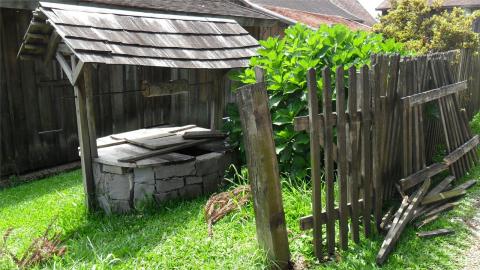
Although your well water may look clear and taste clean to you, keep in mind appearance and taste are only clues about its overall safety. While some contaminants may give off an unpleasant odor or taste, the only way to truly assess the quality of your water is through a laboratory test. Since some contaminants in our drinking water can pose a risk to your health, a test from an accredited lab is highly encouraged every 3-5 years.
The NH Department of Environmental Services (NHDES) provides a list of accredited labs that perform well water testing services in New Hampshire and neighboring states. Whichever lab you choose will provide instructions on how to request a kit and gather a sample for testing.
Origins of Well Water Contamination
Well water originates as rain and snow that then filters into the ground. As it soaks through the soil, the water can dissolve materials that are present on or in the ground, potentially becoming contaminated. Some contaminants are naturally occurring in soil and rock such as bacteria, radon, arsenic, uranium, and other minerals. Other contaminants originate from human activities including improper waste disposal, road salting, and fuel spills.
Even typical residential activities, such as the use of fertilizers and pesticides, fueling of lawn equipment, and disposal of household chemicals can contaminate the ground when done improperly. That is why taking measures to protect your well from contamination is so important.
The EPA recommends taking measures to prevent water well pollution including installing a well cap or sanitary seal, hiring a certified well driller for construction and modification, avoiding mixing or using potential pollutants near your well, regularly pumping and inspecting your septic system, periodically inspecting exposed parts of the well for cracking, corrosion, and damage, and regularly inspecting above ground and underground storage tanks on your property.
Testing Options
A standard analysis will look for common contaminants, some of which can pose a health hazard, while others only affect the smell or taste of your water. A standard analysis tests for arsenic, copper, iron, nitrate, nitrate, bacteria, fluoride, lead, pH, uranium, chloride, hardness, manganese, sodium.
A Radiological Analysis tests for uranium, analytical gross alpha and radon. Naturally occurring radioactive elements in our NH rocks can dissolve easily in water. In addition to the standard analysis, the the NHDES recommend getting this test every 3 to 5 years.
Additional Tests:
Volatile Organic Compounds (VOCs): The common VOC’s in NH are MtBE, benzene and industrial solvent. MtBE and benzene can be found in gasoline. You might consider this test if you suspect gasoline leaks above ground or from underground storage tanks in the vicinity of your well. It could also be appropriate if you live in a heavily developed area.
Synthetic Organic compounds (SOCs): You may want to test for pesticides, herbicides and other synthetic organic compounds if your water has elevated nitrite or nitrate concentrations. This test may also be appropriate if you’re aware of intensive application of SOCs in the vicinity of your well.
Per- and Polyfluoroalkyl Substances (PFASs): PFAS has been found in New Hampshire water, and is considered a public health concern. If you live in an area of interest for PFAS, NHDES may test your well. Learn more on the NHDES website NH PFAS Investigation.
Radon Air Test: The greatest exposure risk for radon is by inhaling air with elevated levels of radon gas. The National Radon Program Services offers a testing kit, as do some home improvement stores.
Interpreting Your Test Results
Your test results will reveal the levels at which any of the tested substances were found in your water sample. The mere presence of these contaminants in well water does not necessarily imply that there is a problem. However, when levels exceed state or federal health standards, you should take steps to correct the situation. For specific recommendations, take your lab results and enter them into the NHDES site Be Well Informed. Entering your results will give you an evaluation on the quality of your water and provide advice on treatment options if necessary.
Planning For Ongoing Maintenance
Several methods are available from commercial contractors to treat contaminated water. After following recommendations from the NHDES Be Well Informed tool, test your well every 3-5 years. More frequent testing is recommended by NHDES in the following cases:
-
Heavily developed areas with land uses that handle hazardous chemicals
-
Recent well construction activities or repairs (after thorough flushing of the pipes)
-
If high levels of contaminants were found in previous tests
-
If you notice a change in your water’s taste, smell or appearance
Testing your well water on a regular basis will give you the peace of mind needed to ensure the safety and well-being of everyone in your household.
UNH Cooperative Extension Master Gardener volunteers share information about home, yard, and garden topics with the people of New Hampshire. Got questions? Master Gardeners provide practical help finding answers to your questions through the Ask UNH Extension Infoline. Call toll free at 1-877-398-4769, Monday to Friday, 9 a.m. to 2 p.m., or e-mail us at answers@unh.edu.
Do you love learning about stuff like this?
SUBSCRIBE TO Granite State Gardening newsletter
Got questions? The UNH Extension Yard and Garden Infoline offers practical help finding answers for your yard and garden questions.
Call toll free at 1-877-398-4769, Monday to Friday, 9 a.m. to 2 p.m., or fill out webform.


